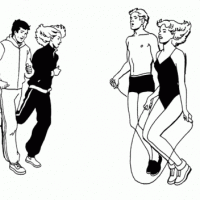How Badly Do You Want To Lose Weight?
To which the pianist replied along this line, "No you wouldn't, because if you really wanted to play like me, you would have already given everything and you would play like me."
Kind of blunt and in-your-face, but a valid point.
Sure, almost every one of us has all kinds of commitments and obligations that serve as genuine and imagined obstacles to our dreams. We have kids to feed and raise, so we can't take off from work and write the great American novel. We have a mortgage, car payments, and there's last year's doctor's bills still unpaid, so we stay at the job we hate because it pays us enough to make the payments we obligated ourselves to, and the job we would "give anything" to have doesn't. In many cases, we simply do what we do because that's what we know how to do and we are afraid to go towards the unknown and try to put on a new kind of skin.
That sort of sounds like NOT being willing to "give anything".
However, on the other side of the coin are all of those who HAVE achieved their dreams, and perhaps went beyond their dreams because they were willing and able to "do whatever was necessary", hopefully within reason, to get there.
Whatever the real or imagined obstacles, in truth, most can be worked around or dealt with in some way if we really want to achieve the goal. Oh yes, it is hard to walk off from a job today, but that doesn't mean you cannot plan how to move out of that job in a year.
So what does this have to do with weight loss?
Well, losing weight is simply another goal like any other. Also, while there are those with genuine medical or clinical conditions which make almost any sort of standard weight loss program impossible, most humans can do the things necessary to accomplish their weight loss goal.
Part of the problem is, however, that:
1. Most people don't really know what it is they are seeking.
2. They don't really know how to get there.
3. And even if they knew 1 and 2, they would not be able to sustain the motivation to "give anything" to get there.
Most people simply say, "I want to lose weight" without assigning much other importance to it. If they were to put it into some sort of perspective meaningful to them, such as, "I want to lose weight so I will be able to watch my grandchildren grow up" or "I want to lose weight so I will no longer have to suffer the indignities and medical sufferings and risks of someone in my condition" then they would have a better focus on their actual goals.
Normally, no one's plan is to deprive themselves of favorite foods and the accompanying festivities and social pleasures or to cause themselves repetitive physical pain, discomfort, and sweat simply for the goal of fitting into a dress one size smaller...at least not for any length of time. However, many of us would be more willing and able to endure all sorts of things if the prize were of genuine and lasting value to us.
Equally, however, must be the ability to believe that the goal is achievable. This is one of the values of knowing how to get there. When we know how something works, and, better yet, know also for a fact that it truly does work, we are better able to come up with a plan for using that to achieve our goal. In this instance, knowledge truly is power, as it can not only provide the tools with which to achieve our goals, but it can help us better understand what those goals should be.
Learning how exercise works, what the weight loss process is, how the human body functions, and how long it can realistically take to achieve our goal can help us over a lot of bumps along the way.
A clear example of this that I have experienced with someone very close to me, is the fact that when someone begins to exercise as part of their weight loss plan, their weight often goes up in the early stages of the exercise program. The explanation is too long for this discussion, but it is a normal event and is actually a bit of good news to the exerciser. In a few days, the weight will begin going down again, and weight loss will actually be facilitated by the exercise that has already been done. However, to someone who did not know this, this initial weight gain could be viewed, and usually is viewed, as "failure"...either of the exercise or of the person.
At the end, success often comes down to the willingness to persevere even when the going gets tough or the goal seems as unreachable as it did the day we started. Again, this is the value of knowing where we really are going and how we intend to get there. If the goal is the next smaller dress size, that might be more difficult to achieve than improving our health so that we can be a better employee, spouse, family member, coworker, or person. If the steps along the path are known, it becomes less important to keep watching the end than keeping an eye out for the next plateau.
Still, no matter how good the plan or how clear the goal, it is the desire that is strong enough to sustain the willingness to "give anything" to get there which will usually determine success or failure.
Related Articles
-
Lose weight, strategies for losing weight
The most effective weight loss strategy is one that promotes overall b
-
Fat Burning Furnace - Rapid Weight Loss Diet with a Concept You Wont Believe!
Learn How to Lose 26 Pounds in 7 Weeks! Rapid Weight Loss Diet with a
-
Getting Yourself Down To Your Perfect Weight
If you always seem to be on one diet or another, it is time to get of
-
Reviewing The Sonoma Diet Plan: Mediterranean Power Foods Can Make You Slim
There is no shortage of diet plans available these days. Some diets re
-
Calculating and interpreting BMI for females
-
How to Overcome Junk Food Cravings with Weight Loss Hypnosis
You know that you have to say no to junk food but this can be one of
- DON'T MISS
- Will You Be Able To Stick With A Bariatric Diet Plan?
- Lose Calories to Get a Tummy to Flaunt on the Beach
- Paleo Recipe Essentials
- Fat Burning Furnace - Cheap Diet Plan without Breaking the Bank!
- How Can You Benefit from HCG Diet Plan
- The Diet Of A Lion
- Crash Diets Facts To Consider
- Intermittent Fasting - How to Lose Weight Fast Safe!
- The Diet Solution Program Bad Reviews-your own considering the nature of foods
- The Best Way To Burn Belly Fat




